Welcome to our comprehensive guide on ethical diamonds that conscientious consumers crave.
In this enlightening article, we’ll explore the concept of ethical diamonds, their soaring popularity, sourcing methods, and how you can ensure your diamond is ethical.
Ethical diamonds are mined without exploiting workers or the environment, unlike their unethical counterparts. We delve into the rise of ethical diamonds, measures like the Kimberley Process, and the efforts of non-profit organizations.
Empower yourself with knowledge to make informed choices as you embark on your ethical diamond journey in this Ethical Diamonds Conscientious Consumers Need to Know Guide set by BrighterGuide.
Related article: EGL Diamond Certification Review
Key Takeaways
- Ethical diamonds prioritize human rights and environmental sustainability, distinguishing them from blood diamonds.
- The diamond industry faces ethical concerns like worker exploitation, environmental damage, and the trade of conflict diamonds.
- Conscientious consumers can ensure ethical diamond purchases by understanding their origin, seeking certifications, and demanding supply chain transparency.
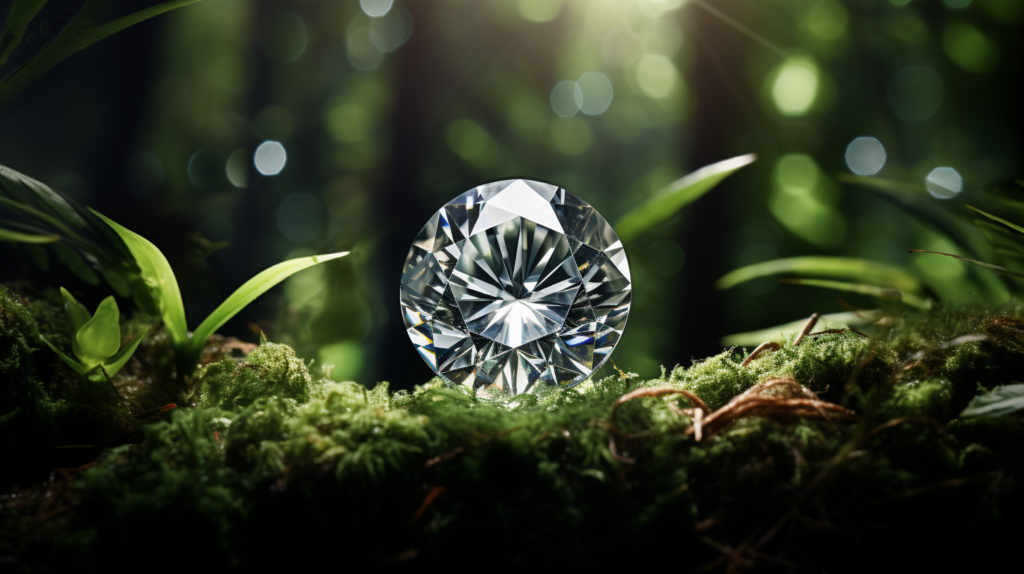
What are ethical diamonds
First, let’s delve into what ethical diamonds actually are. Ethical diamonds are diamonds that are mined without exploiting workers or harming the environment. Unlike blood diamonds, which are mined through violence and terrorism, ethical diamonds prioritize human rights and environmental sustainability throughout the entire supply chain. These diamonds can be either natural or lab-grown, as long as they meet the ethical standards.
Conscientious consumers play a vital role in the demand for ethical diamonds. By choosing to purchase conflict-free diamonds, they actively contribute to the eradication of human rights abuses in the diamond industry. It’s essential for consumers to be aware of the origin and certification of the diamonds they buy. The Kimberley Process, for instance, ensures that conflict-free diamonds are removed from the supply chain. Additionally, independent lab certificates provide valuable information about a diamond’s story and authenticity.
Another option for conscientious consumers is to consider recycled diamonds. By recycling diamonds from family heirlooms or antiques, consumers can avoid causing further harm to indigenous communities and the environment. Some countries, like Canada, have stricter regulations regarding diamond mining, ensuring fair labor practices and environmental protection.
The Dark Side of Mined Diamonds
When it comes to mined diamonds, it’s crucial to acknowledge the ethical concerns surrounding their production. From the exploitation of workers to the environmental impact of diamond mines, there are significant repercussions associated with the mining process.
Additionally, the purchase of conflict diamonds unknowingly contributes to violence and strife in mining communities. As conscientious consumers, it’s important to be aware of these dark aspects and make informed choices to support ethical diamond practices.
Ethical Concerns of Diamond Mining Practices
What are the ethical concerns surrounding diamond mining practices?
Diamond mining practices have long been associated with a dark side that conscientious consumers need to be aware of. Here are three ethical concerns that arise from diamond mining practices:
1. Human rights violations: Unethical diamond mining often exploits workers by cutting wages and putting them in danger. Some child labor denies children their right to education and safety.
2. Environmental issues: Diamond mining can have severe environmental repercussions. Deforestation, soil erosion, and water pollution from irresponsible mining can harm wildlife and ecosystems. Additional environmental damage can result from heavy machinery and chemicals.
3. Unethical practices: Many diamond mines lack transparency and accountability, making it hard to trace diamonds’ ethical origins. This raises concerns about supporting a company that may indirectly harm human rights and the environment.
These ethical concerns highlight the need for conscientious consumers to seek out ethical diamonds that prioritize fair wages, safe working conditions, and environmental sustainability. However, these concerns extend beyond the mining process and also encompass the environmental impact of diamond mines.
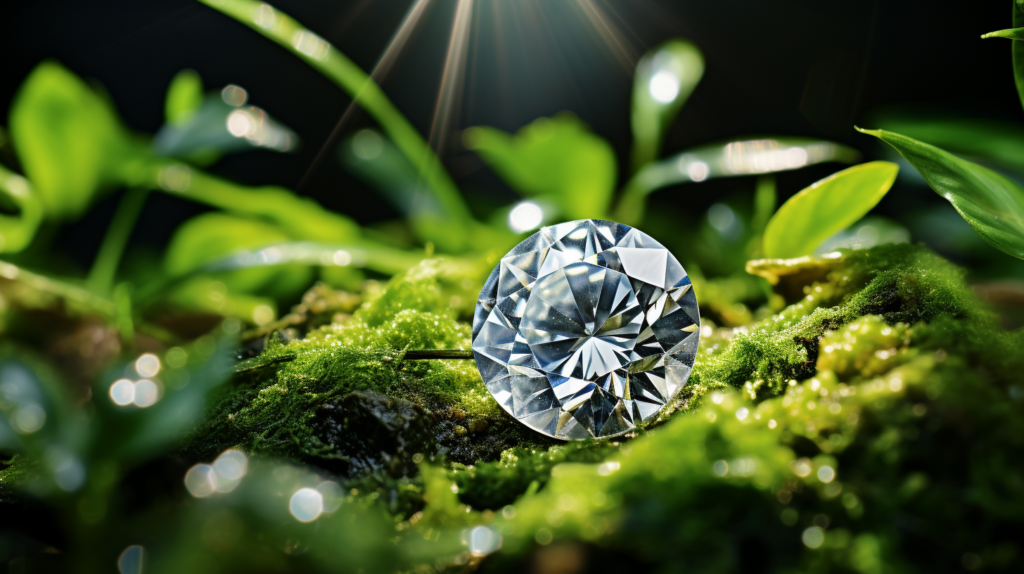
The Environmental Impact of Diamond Mines
We must acknowledge the significant environmental impact that diamond mines have, shedding light on the dark side of mined diamonds. Understanding our purchases’ environmental impacts is essential for conscientious consumers.
Deforestation, soil erosion, and water pollution can result from diamond mines. Mining operations emit greenhouse gases and worsen climate change. Environmental damage is increased by open-pit mining and toxic chemical use.
Diamond mining uses a lot of water, which can pollute nearby communities. Responsible sourcing and ethical diamonds offer a solution, promoting fair labor practices and minimizing the environmental impact of mining.
Repercussions of Buying Conflict Diamonds
As conscientious consumers, we must frequently consider the repercussions of buying conflict diamonds, as they contribute to the dark side of mined diamonds. Here are three reasons why the trade of blood diamonds has such devastating consequences:
1. Human suffering: Conflict diamonds are often mined in African countries plagued by armed conflicts. Diamond miners, including men, women, and even children, are forced to work in hazardous conditions, enduring exploitation and abuse. Supporting the trade of conflict diamonds perpetuates this cycle of human suffering.
2. Armed conflicts: The sale of conflict diamonds funds rebel groups and perpetuates violence in mining communities. The profits from these diamonds are used to purchase weapons and fuel armed conflicts, causing immense harm to innocent civilians.
3. Lack of fair trade: Conflict diamonds bypass fair trade practices, denying diamond miners fair wages and safe working conditions. By purchasing conflict diamonds, we contribute to an unjust system that exploits vulnerable communities and perpetuates inequality.
Understanding the repercussions of buying conflict diamonds is crucial in our quest for ethical alternatives.
Now, let’s explore the differences between lab-grown and mined diamonds.
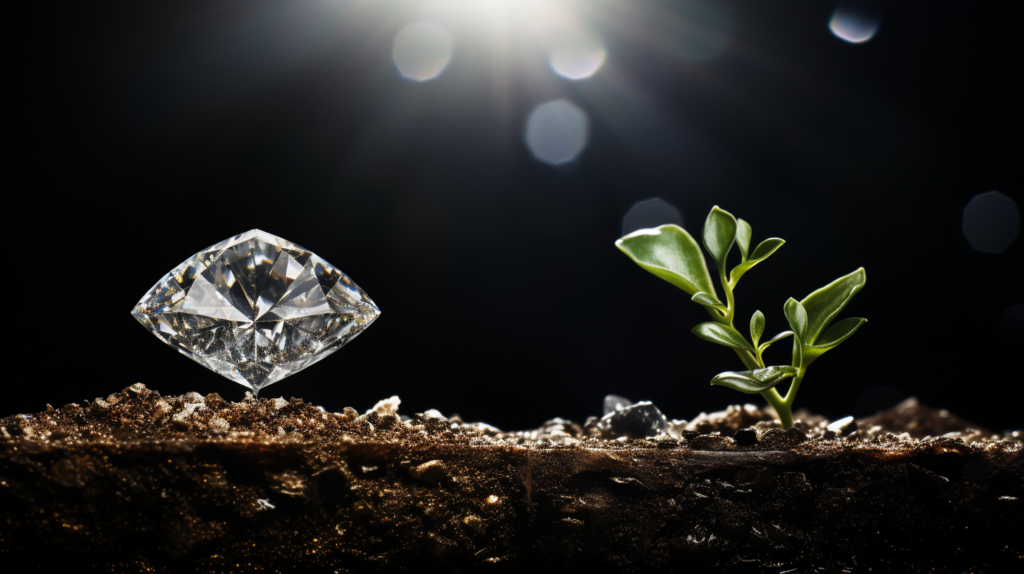
Differences Between Lab Grown and Mined Diamonds
Lab grown diamonds offer a sustainable and ethically sourced alternative to mined diamonds. In recent years, the lab grown diamond industry has gained traction as conscious consumers become more aware of the ethical issues surrounding natural diamond production and trade. Grown diamonds are lab-grown diamonds made with advanced technology. They have the same chemical composition and physical properties as natural diamonds but are produced more sustainably.
One of the main differences between lab grown and mined diamonds is the ethical implications. The natural diamond industry has faced scrutiny due to the humanitarian and environmental consequences associated with diamond mining. On the other hand, lab grown diamonds eliminate the need for mining, reducing the negative impact on communities and ecosystems. They also bypass the diamond trade, which has historically been linked to unethical practices.
From a consumer perspective, the choice between lab grown and mined diamonds comes down to personal values and priorities. Some may prioritize the traditional allure and rarity of natural diamonds, while others may prioritize the ethical considerations associated with lab grown diamonds. It’s important for conscious consumers to research and understand the differences between these options before making a diamond purchase.
How can you be sure that the diamond you are purchasing is ethical
It is important to make sure that the diamond you buy was obtained in an honest way. As responsible shoppers, we have the power to make smart choices and back businesses that do the right thing.
Here are three key steps to help you be sure that the diamond you’re purchasing is ethical:
1. Know the origin: It’s crucial to be aware of the country of origin issues when it comes to diamonds. Some countries have been linked to violations of human rights and unethical mining practices. If you look into where the diamond came from, you can make a smart choice and pick diamonds from places like Botswana, Namibia, and Canada that have stricter rules.
2. Look for certifications: The diamond industry has established the Kimberley Process to remove conflict diamonds from the supply chain. This process ensures that 99.8% of diamonds are certified conflict-free. Additionally, independent lab certificates provide valuable information about the diamond’s story and can help you verify its ethical sourcing.
3. Traceability and transparency: A reputable jeweler should be able to provide information about the diamond’s supply chain and the mine it was sourced from. Ethical diamonds often come with a unique ID number that allows traceability back to its source mine. By asking for this information, you can ensure that the diamond you’re purchasing is ethically sourced.
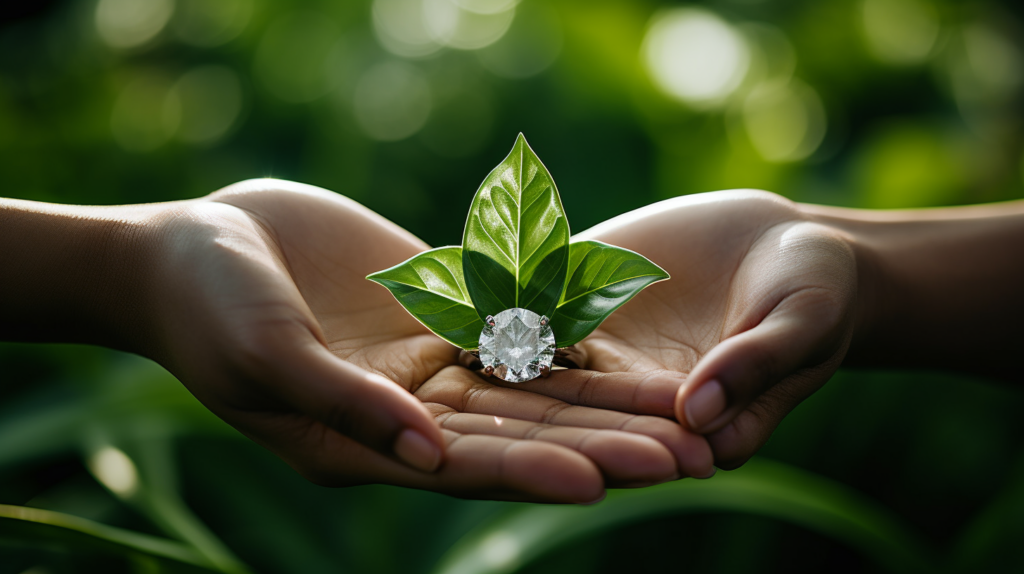
You can trust Clean Origin to give you lab-grown diamond jewelry
Clean Origin is proud to sell lab-grown diamond jewelry that you can trust. We understand how important moral diamonds are to people who want to make the world a better place. Lab-grown diamonds are an environmentally friendly and moral choice to diamonds that are mined from the ground. Because our lab-grown diamonds are made in a controlled environment using cutting-edge technology, they do not have any of the social or environmental problems that come with diamond mining.
There is no doubt that when you pick Clean Origin, you are being responsible and moral. Not only are the diamonds we grow in the lab conflict-free, they also last a long time and are good for the earth. They are better for the environment because they use less water and energy to make than stone mines.
It is good to know that our lab-grown diamond jewelry is also stylish and useful. We have many styles, such as eco-friendly engagement rings, moral wedding rings, and even vegan engagement rings for people who want to support options that are good for animals. There is an engagement ring for every style and taste here, from the classic solitaire to the trendy double halo.
Our Favorite Ethical Engagement Rings
When it comes to ethical engagement rings, there are a few brands that stand out for their commitment to ethical sourcing and quality craftsmanship.
Aether Diamonds offers luxurious ethical engagement rings that aren’t only stunning but also made with ethically sourced diamonds.
On the other hand, Mejuri provides affordable options without compromising on ethical standards, making them a great choice for conscientious consumers seeking beautiful and sustainable engagement rings.
Best For Luxury: Aether Diamonds Ethical Engagement Rings
We absolutely love Aether Diamonds ethical engagement rings as the best choice for luxury. These stunning rings aren’t only visually stunning but also ethically sourced, making them the perfect option for conscientious consumers who desire both beauty and sustainability.
Here’s why Aether Diamonds stands out:
1. Exceptional craftsmanship: Aether Diamonds creates exquisite engagement rings that are meticulously crafted to perfection. Each ring is a work of art, showcasing the skill and expertise of their master jewelers.
2. Ethical sourcing: Aether Diamonds is committed to sourcing their diamonds responsibly, ensuring that they’re conflict-free and mined with the highest ethical standards. They prioritize fair labor practices and environmentally sound mining methods, giving you peace of mind knowing that your ring isn’t contributing to any harm.
3. Luxury without compromise: With Aether Diamonds, you don’t have to sacrifice luxury for ethics. Their engagement rings are made with the finest materials and designed to be timeless, allowing you to celebrate your love with a ring that’s both luxurious and ethically conscious.
Choosing Aether Diamonds for your engagement ring is a statement of your values and a symbol of your love, making it the ultimate choice for the conscientious luxury consumer.
Best for Affordability: Mejuri Ethical Engagement Rings
Mejuri Ethical Engagement Rings are the perfect choice for affordability and conscious consumers. When it comes to ethical diamonds, Mejuri’s goal is to make sure that their beautiful and affordable engagement rings follow ethical standards.
As conscientious consumers, we understand the importance of supporting brands that prioritize worker well-being and environmental sustainability. Mejuri sources their diamonds from trusted suppliers who adhere to ethical mining practices, ensuring that their diamonds are conflict-free and responsibly sourced.
Not only are Mejuri’s engagement rings affordable, but they also offer a wide range of styles and designs to suit any individual’s taste. When you choose Mejuri, you can be sure that you are being responsible and saving money without giving up style or quality.
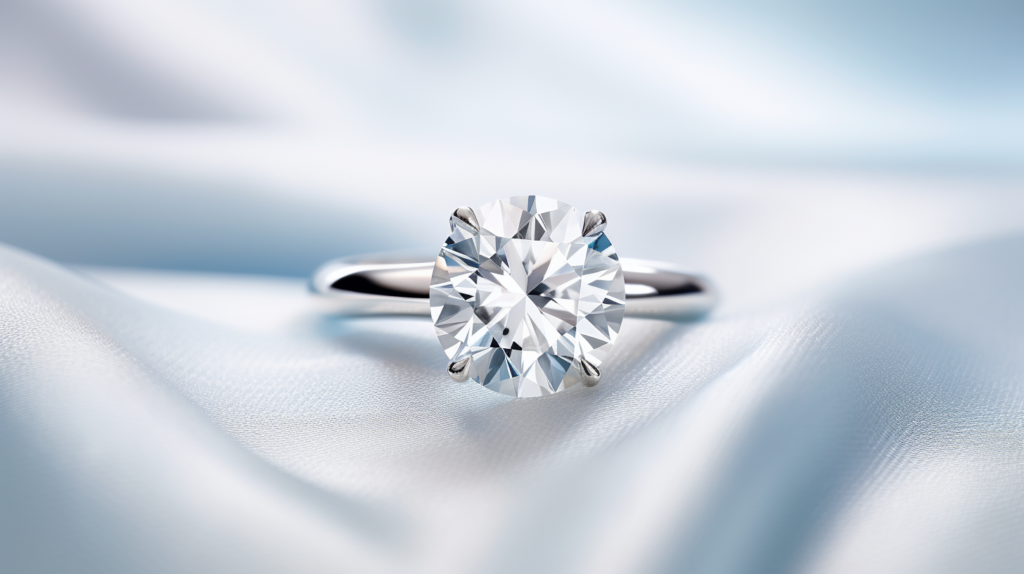
Conclusion
We now know where to find diamonds that are mined in an ethical way, how to get them certified, and why it is important to back these kinds of mining. As conscientious consumers, it’s crucial for us to make responsible choices when purchasing diamonds and to consider the impact our choices have on the diamond industry and the world at large.
Here are three key takeaways from our guide:
1. The fact that we sell ethical diamonds shows that we care about workers’ rights and fair conditions. By picking diamonds that come from mining that is done in an honest way, we can help make the working conditions for miners better and protect their rights.
2. Supporting responsible mining practices is essential for environmental sustainability. Ethical diamonds are mined with minimal environmental impact, and mining sites are rehabilitated for future use. By opting for ethical diamonds, we can help preserve our planet’s natural resources.
3. Consumer trust is crucial in promoting positive change in the diamond industry. As ethically-minded consumers, we’ve the power to demand transparency and accountability from diamond suppliers. By asking questions about the origin of diamonds and supporting jewelers who prioritize ethical sourcing, we can drive the industry towards more responsible practices.
Sources
BrighterGuide is dedicated to providing accurate and relevant information as you explore the wonderful world of diamonds and jewelry. To this end, our writers refer to primary information sources in building each article that appears on this website. These include, but are not limited to, published news articles, government portals, research papers, and more.
- Rosero, M. (2023). How to Ensure Your Diamond Is Ethical (A Conscious Consumer’s Guide). Beldiamond. https://www.beldiamond.com/blogs/guidance/how-to-ensure-your-diamond-is-ethical
- Schulte, M., Balasubramanian, S., & Paris, C. M. (2021). Blood Diamonds and Ethical Consumerism: An Empirical investigation. Sustainability, 13(8), 4558. https://doi.org/10.3390/su13084558